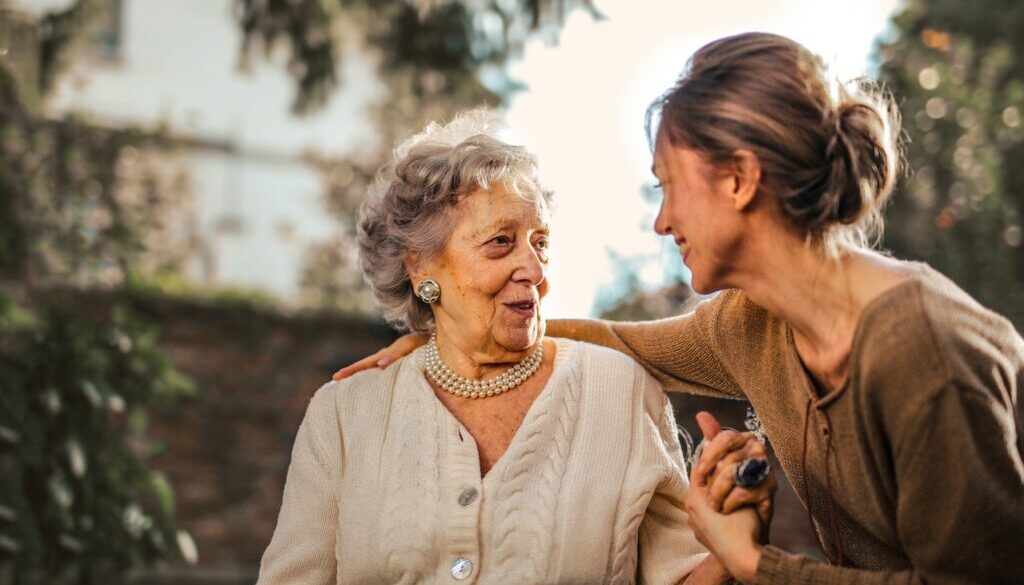Does My Loved One Need Assistance?
Can your elderly loved one still live at home alone? Tips to help guide you through the decision-making process.
Is your loved one (LO for short) losing their ability to take care of themselves?
Are these questions you are asking yourself?
- Should I put my LO in a facility, keep them in their home with hired care, or move them in with me?
- Should I become a full-time caregiver for my LO?
- If I do move my LO into a facility, what are my options?
- Once I decide the type of facility, how do I know which one to choose?
The decision to place a LO in a care facility or to have assistance provided in their home is a very personal one… and a very tough one. I have been an occupational therapist for 30 years and operated a small residential assisted living facility for the last 6 years. I have been involved in and have witnessed this type of decision more times than I can count. And I will tell you, it is never easy for any of the parties involved.
The first step is determining whether your LO needs care and is no longer able to live independently. Here are some signs that may indicate that they need additional care:
- They are starting to present with poor hygiene.
- There are stacks of unpaid bills and mail in the home.
- There is limited food in the house or the food in the fridge is spoiled.
- Even if food is available and fresh, they are forgetting to eat or are unable to prepare food for themselves.
- You may notice they are losing weight.
- They are showing signs of depression, apathy, or isolation – will not answer the phone or show no interest in going anywhere or doing anything.
- There is a lot of clutter or there are tripping hazards in the home.
- Daily tasks are hard for them to perform.
- The house is dirty, dishes are piled in the sink, the house smells bad, laundry is piled up.
- They have a medical condition that is not being properly managed.
- You notice medication is piling up and they do not know their medication schedule.
- You may start getting more phone calls from them, especially at night.
- Their eating habits have changed.
- They are experiencing mobility issues or having falls. They may have difficulty getting out of a chair. You may notice bruises on them from falls or bumping into things.
- They are having toileting issues. You may notice wet sheets or soiled clothes. You may notice urine or feces on the floors.
- You might notice dents and dings on their car.
- They may exhibit forgetfulness causing safety concerns, like leaving a burner on or doors open. They may even wander or go for a walk and forget where they are.
- You may notice behavior changes like confusion, anxiety, depression, aggression, paranoia, hallucinations, or delusions. You may notice some behavior changes later in the day, which is sometimes referred to as sundowner’s syndrome.
The transition to adding care for your LO can be a challenge. You may want to have a meeting with family members to discuss your concerns and start a conversation about options for assistance. It may be helpful to slowly start to introduce the idea to your LO. Prepare to be patient as it may take several discussions. Be mindful of the time you choose to have these discussions. It should be at a time that your LO is more relaxed and not anxious or in a rush. Some elderly people welcome the idea. They might welcome the company and the assistance, and it can reduce their anxiety. Some will fight “tooth and nail” about the idea, and it may take a little more effort and creativity in your presentation. These are some ideas that might be helpful in encouraging them to accept help:
- Show empathy. Aging loved ones want to hold on to their independence and may be reluctant to “burden” you. If they think your offer is sincere and that you just want to lighten their load, they might be more accepting. Avoid negative statements like, “your house is a mess and you need help cleaning” or “you aren’t even taking your meds correctly”. This will put them on the defensive and make your job harder. You could try statements like, “It must be frustrating to keep up with everything when you get tired” or “I know it’s a lot to keep track of. I would really like to help you get someone to come in and help with the morning routine. I would like to do this as your Christmas gift!” I understand that this may not work for everyone. There are many of our LO who will resist all requests and just want to be left alone. Different personalities may require different approaches.
- Give them options or choices. “Dad, I found a great lady who could use some work and she does house cleaning. It would be great if you would give her a try. What time of day works best for you? Morning or afternoon?”
“Mom, I brought some leftovers for you to eat today and tomorrow. I know you get busy so I’m going to call you to remind you to eat them. What time is best for me to call about lunch?” Maybe a neighbor or friends from church could rotate visits and stop by at certain times to check on your LO.
- Consider adaptive equipment or any type of aid that might improve safety with their ADLs (activities of daily living). Basic ADLs are things like bathing, dressing, toileting, grooming, feeding self, and showering. IADLs, or instrumental ADLs are more complex, such as homemaking, finances, or meal prep. Examples of adaptive equipment include: reachers (grabber sticks) to pick things up from the floor or help them get their pants on, long shoehorns to help with shoes, raised toilet seats, adapted utensils, grab bars, shower chairs/benches. You can safe-proof ovens and cabinets. There are automated medication dispensers, fall alert necklaces and bracelets. If they have had a decline in function, you can talk to their doctor and request a homecare assessment in which nurses and therapists can come in and evaluate the safety and needs in the home. Sometimes a few simple modifications and safety devices can make all the difference. I will attach a home safety checklist that you may find helpful in these early stages.
- Meal assistance. There are meal prep and delivery plans you could sign up for or check senior services in your area for Meals on Wheels, which is a community based, non-profit program dedicated to provide seniors with support of a nutritious meal.
- Adult day care programs or senior lunch programs. I have worked with many seniors who loved the socialization and structure of an adult day care program. There are many programs that offer half day services. They will have scheduled activities/games/exercises, places designated to sit and rest, meals and snacks, and some will assist with toileting and showers. Check your area for “seniors at lunch” programs as well.
- Housekeeping services. If you start slowly with maybe someone to clean the house regularly or even drop off groceries, your loved one may become more open minded to hired care in the home.
- Other services. This transition is hard on families because private care is not typically covered by insurance. Insurance will likely cover short- term homecare services, such as nursing, OT, PT, Speech, and an aide if your loved one has had a change in status/decline, but that is short term, and they will schedule periodic visits throughout the week that will likely last less than an hour. The homecare staff are usually good at helping you determine if your LO is safe to be left alone. Try to connect with the team and share your specific concerns so they can address them in therapy. Concerns can range from showering, meal prep, getting the mail, walking, toileting, and so forth. Many homecare providers have a social worker who can give you resources for additional resources if needed. Your city probably has a senior resource program that you can call and find out about local resources. If your LO has any type of long-term care insurance, then that plan might cover some private care. Some people just need a little help and set up in the morning and then they do ok throughout the day. Or they may need help with the dinner and bedtime routine. If they were a veteran, you can check their VA benefits. Sometimes they are eligible for a veteran’s Aid and Attendance benefit that offers some in-home care.
There are also private duty care agencies. You can do a google search to locate agencies in your area. This is a nice place to start if you are trying to keep your LO at home. They can offer a variety of services that may include companion care, homemaker care, personal care, or live-in care.
Some of you have been asking yourself “The question”, “Should I become their primary caregiver?”
This is a big decision, and it is a very personal one that only you can make. It would require that you move in with them or they move in with you. From experience, I recommend that you do not make this decision from a place of guilt. There are many reasons a person may want to care for a LO as well as many reasons that it may not be in everyone’s best interest. Most of the situations that I have witnessed that were decided out of guilt, manipulation, or intimidation, have not turned out positively.
Here are some things to consider about becoming the caregiver:
Your physical and emotional capacity:
Every situation is different and the level of care that a person needs will be different. As your LO requires more care, it may become a very physically and emotionally challenging job. Assisting with daily tasks such as toileting, dressing, showering, or assisting them to appointments may require physical effort on your part. You may have to assist with medications, cooking, and cleaning as well. Consider your own physical health as part of the equation. How are the current stressors in your life? (aside from the worry about your LO). Watching a LO struggle with daily tasks or health decline can be emotionally stressful as well. If they have dementia, you may experience their changing personalities and behaviors. Caregivers can sometimes develop their own health problems as a result of becoming a caregiver due to neglect of their own self-care.
Expenses:
Consider the loss of wages if you must leave your job to become a caregiver. Will you lose retirement benefits? Would you be able to do any work from home?
Will you have costs of home renovation if you share a home with your LO? They may eventually need adaptations made for safe mobility (ramps, bathroom equipment, etc.).
Some people ask if they can get paid to be a caregiver for their LO. I recommend checking your state Medicaid program, Veterans program (if they are a veteran), or their long-term care insurance plan (if they have one), to check eligibility for compensation for becoming the caregiver. Check with your employer to see if you have a Paid Family Leave benefit that might help short term. If you need part-time private duty care, consider that cost as well.
Share the care:
Do you have other family members who would share in the care of your LO? Is it a possibility to have a family meeting to discuss how everyone could help keep your LO at home for as long as possible? If they are unable to provide the care directly, can they help in another way? Could they help manage the bills/finances, mow the lawn, rides to appointments, pick up groceries or bring meals, pitch in money, help with housecleaning? Some families even include the grandkids to help with some of the duties.
If you choose to bring your LO to your home or to move in with them, consider giving yourself a time frame to try this arrangement. After this trial phase (6 months, or another timeframe of your choosing), you may realize that:
- It’s time to hire outside help OR
- Bring them to an adult day program for some daytime hours OR
- You may have to move them to a facility that can care for your LO.
- This arrangement is working out very well and you enjoy being the primary caregiver.
Once you have made your decision, I hope for you that you can stand strong in that decision and know that you are doing the best you can in this moment. Please refer to my prior blogs on giving yourself grace as a caregiver. If you choose a facility, I have a blog that will give you some tips on choosing a facility. If you are caregiving at home or hiring a caregiver, I have a blog on organizing and decluttering in preparation.
What if my LO refuses to accept help or go to a facility?
This is a tough one. Hopefully it would not come to that. It is very hard to have someone removed from their home against their will. They must be proven to be incompetent to make decisions for themselves. Even if you are the medical POA, you cannot force them to leave their home if they are still capable of making their own decisions. If they are a harm to themselves or others, you can call law enforcement or Adult Protective Services to keep them safe. You may want to seek counsel from an elder care attorney. They can advise you on how to apply for guardianship and help you through the process if you think your LO is incompetent to make decisions for themselves.
Your LO is lucky to have you as an advocate, no matter which direction you go. Hopefully, with some time, compassion, and regular conversations, your LO will come to agree with an option that is suitable for them. Either way, you will be involved in making sure they get the best care, and that is the most important thing. Wishing you much luck in this chapter of your and your LO’s life.
Thank you for your caregiver heart,
Love,
Heather



